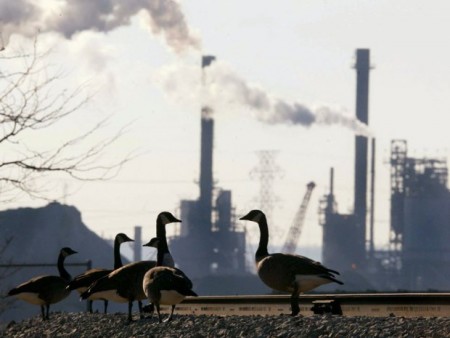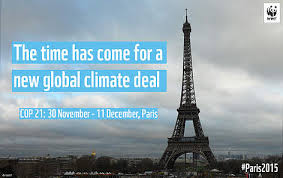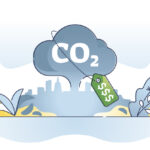November 14, 2015 – Paris and all of France today is in mourning over the attacks that murdered more than 120 of its citizens yesterday. And in just over two weeks the city will have to once again gain its balance as host of COP 21, the United Nations Convention on Climate Change Earth Summit. This will be a tough act and one wonders if the success hoped for may be impaired by the violence of yesterday. Let’s hope not because time is running out on gaining meaningful global climate action.
The newly elected Canadian government is coming to COP 21 with an old agenda established by the previous holders of office. Hardly ambitious in its targets and with no roadmap to achieve them, Canada has been seen by the global community to be a climate change laggard. The country set 2020 greenhouse gas emission targets at 17% below 2005 levels. Currently it is on track to be 19% above 2005 levels by 2020. The government further committed to achieving a 30% reduction below 2005 levels by 2030. How to get there was never specified.
The time to engage the rest of the planet and take a meaningful hack at global warming from a Canadian perspective is now at hand and the not-for-profit Climate Action Network has drawn up a plan which the government should seriously consider.
As I have written in the past, the global community’s commitment to keep the atmospheric mean temperature rise to no more than 2 Celsius (3.6 Fahrenheit) degrees is dangerous because of unforeseen tipping points along the way to that rise. A better maximum target to achieve has been recommended by those countries who presently are being affected by global warming and who will be its first victims. That maximum mean is 1.5 Celsius (2.7 Fahrenheit). In advance of COP 21 more than 950 organizations including national governments are making this recommendation.
The Climate Action Network in drawing up its Canadian action plan states that based on current global commitments the world is heading to a 2.7 Celsius (4.9 Fahrenheit) degree rise by century end. To counteract this less than ideal end result it suggests the country in taking its share of global responsibility commit to these 12 principles:
- A target warming of no more than a mean average of 1.5 Celsius (2.7 Fahrenheit) degrees.
- Decarbonization of the economy by 2050 with a full phase out of fossil fuels burned for energy generation, replaced by 100% energy production from renewable zero-emission sources.
- A 2025 target of 35% below 2005 emissions.
- A 2030 target of 50% below 2005 emissions.
- Enshrining these commitments into domestic law.
- Creating a process for national implementation involving all levels of government leading to a National Action Plan that spells out finances and responsibilities of all jurisdictions including adaptation and mitigation strategies, commitments and measurable milestones.
- Providing the global Green Climate Fund with $4 billion CDN by 2020 to support climate mitigation and adaptation projects in nations most threatened by global warming.
- Establishing transparency and evidence-based quantification and verification of emissions and their removal.
- Ending of all fossil fuel subsidies beginning with an immediate phase out to be completed no later than 2020.
- Supporting an international binding agreement in Paris that contains measurable and reviewable five-year targets for lowered emissions and funding in Paris that is consistent with those goals described above.
- Ensuring that the international agreement set in Paris phases out fossil fuel emissions and phases in 100% renewable energy by no later than 2050.
- Ensuring that emission reductions everywhere are verifiable and permanent.
For Canada to execute the above requires a significant change in direction from the past and a government that has all sub-jurisdictional players on board. For provinces that generate significant revenue from fossil fuel extraction – Alberta, Saskatchewan and Newfoundland and Labrador, it means a wholesale economic shift. For all of Canada it means balancing what is lost, through phasing out fossil fuels and their contribution to gross domestic product (GDP) and general revenue, with the introduction of new economic opportunities, a knowledge economy that incorporates 21st century technology innovation and diversification.

















